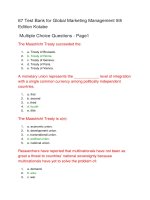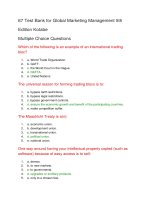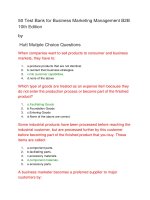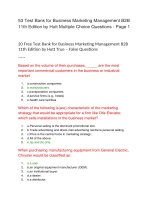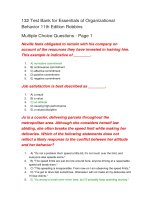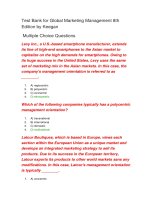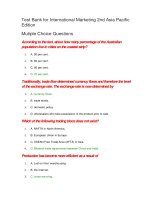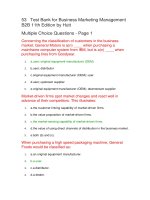73 test bank for business marketing management b2b 11th edition
Bạn đang xem bản rút gọn của tài liệu. Xem và tải ngay bản đầy đủ của tài liệu tại đây (108.47 KB, 17 trang )
53 Test Bank for Business Marketing Management B2B
11th Edition by Hutt Multiple Choice Questions - Page 1
20 Free Test Bank for Business Marketing Management B2B
11th Edition by Hutt True – False Questions
----Based on the volume of their purchases, _____ are the most
important commercial customers in the business or industrial
market.
1.
2.
3.
4.
5.
a.construction companies
b.manufacturers
c.transportation companies
d.service firms (e.g., hotels)
e.health care facilities
Which of the following is(are) characteristic of the marketing
strategy that would be appropriate for a firm like Otis Elevator,
which sells installations in the business market?
1.
2.
3.
4.
5.
a.Personal selling is the dominant promotional tool.
b.Trade advertising and direct-mail advertising reinforce personal selling.
c.Price is the central force in marketing strategy.
d.All of the above.
e.(a) and (b) only.
When purchasing manufacturing equipment from General Electric,
Chrysler would be classified as:
1.
2.
3.
4.
5.
a.a user.
b.an original equipment manufacturer (OEM).
c.an institutional buyer.
d.a dealer.
e.a distributor.
Concerning the chain of suppliers involved in the creation of a
Honda automobile, which of the following fall within the business
marketing domain?
1.
2.
a.Honda purchasing power steering components from direct suppliers.
b.Direct suppliers of power steering systems purchasing sheet metal from
upstream suppliers.
3.
4.
5.
c.Organizations purchasing Honda automobiles for their fleets.
d.all of the above.
e.(a) and (b) only.
When purchasing machine tools for their plants, American Honda
is:
1.
2.
3.
4.
5.
a.an original equipment manufacturer.
b.a user.
c.a distributor.
d.an institutional buyer.
e.an upstream supplier.
Concerning the classification of customers in the business market,
General Motors is a(n) ____ when purchasing a mainframe
computer system from IBM, but is a(n) ____ when purchasing tires
from Goodyear.
1.
2.
3.
4.
5.
a.user; original equipment manufacturer (OEM)
b.user; distributor
c.original equipment manufacturer (OEM); user
d.user; upstream supplier
e.original equipment manufacturer (OEM); downstream supplier
The business market consists of the following three components:
1.
2.
3.
4.
5.
a. commercial enterprises, resellers, and government.
b. manufacturers, institutions, and defense.
c. manufacturers, service organizations, and government.
d. commercial enterprises, service organizations, and government.
e. commercial enterprises, institutions, and government.
The method of classifying industrial goods into meaningful
categories in the business market centers on this question:
1.
2.
3.
4.
5.
a.How does the industrial good enter the production process and the cost
structure of the firm?
b.How much effort are organizational buyers willing to exert in purchasing this
industrial good?
c.Will organizational buyers purchase this industrial good from a distributor or
directly from a manufacturer?
d.What is the weight and unit value of the industrial good?
e.How many product alternatives are organizational buyers willing to consider
before making a choice?
Concerning manufacturing customers, the business market is:
1.
2.
3.
a.concentrated by size.
b.geographically concentrated.
c.experiencing declining growth in many large metropolitan areas.
4.
5.
d.all of the above.
e.(a) and (b) only.
Some industrial products have been processed before reaching the
industrial customer, but are processed further by this customer
before becoming part of the finished product that you buy. These
items are called:
1.
2.
3.
4.
5.
a.component parts.
b.facilitating parts.
c.accessory materials.
d.component materials.
e.accessory parts.
Industrial products and services can be broadly classified as:
1.
2.
3.
4.
5.
a.upstream, downstream, and direct goods.
b.entering, manufactured, and fabricated goods.
c.entering, accessory, and manufactured goods.
d.entering, foundation, and facilitating goods.
e.foundation, accessory, and component goods.
Dayco increased the price of the drive belts that it sells to General
Motors by 5 percent and sales of the item grew by 9 percent. Price
elasticity of demand for drive belts appears to be:
1.
2.
3.
4.
5.
a.elastic.
b.inelastic.
c.neither elastic nor inelastic.
d.sensitive to price changes.
e.none of the above.
Motorola reduced the price of the electronic engine control that it
sells to Ford by 10 percent and experienced a 15 percent increase
in quantity demanded. This suggests that Ford’s price elasticity of
demand is:
1.
2.
3.
4.
5.
a.elastic.
b.inelastic.
c.neither elastic nor inelastic.
d.insensitive to price changes.
e.none of the above.
As an industrial customer, Ford Motor Company would be classified
as:
1.
2.
3.
a.a user.
b.an original equipment manufacturer (OEM).
c.a user in purchasing some products, an OEM in purchasing other products.
4.
d.a producer of facilitating goods.
Market-driven firms spot market changes and react well in advance
of their competitors. This illustrates:
1.
2.
3.
4.
5.
a.the customer-linking capability of market-driven firms.
b.the value proposition of market-driven firms.
c.the market-sensing capability of market-driven firms.
d.the value of using direct channels of distribution in the business market.
e.both (b) and (c).
The ability of an organization to quickly recognize changes in its
market and to anticipate customer responses to marketing
programs is referred to as:
1.
2.
3.
4.
5.
a.market research capability.
b.customer-linking capability.
c.competitive intelligence.
d.market-sensing capability.
e.derived demand.
Market-driven firms demonstrate:
1.
2.
3.
4.
5.
a.the coordinated use of interfunctional resources (for example, research and
development, manufacturing).
b.a set of values and beliefs among employees that places the customer's
interests first.
c.the ability to generate, disseminate, and productively use superior
information about customers and competitors.
d.all of the above.
e.(b) and (c) only.
Mead Paper Company recently purchased a new high-speed paper
machine for one of their plants. The new machine is used in
manufacturing a special grade of paper at a rate of over 1500 feet
per minute. This product would be classified as:
1.
2.
3.
4.
5.
a.a facilitating good.
b.an entering good.
c.accessory equipment.
d.an installation.
e.none of the above.
The distinguishing characteristic(s) of foundation goods is(are) that
they:
1.
2.
3.
4.
a.are capital items.
b.are expense items.
c.become part of the finished product.
d.Both (a) and (c) are true.
5.
e.All of the above are true.
When purchasing a high speed packaging machine, General Foods
would be classified as:
1.
2.
3.
4.
5.
a.an original equipment manufacturer.
b.a user.
c.a distributor.
d.a dealer.
e.an institutional buyer.
When purchasing microprocessors from Intel Corporation to be
incorporated into Dell's line of personal computers, IBM would be
classified as:
1.
2.
3.
4.
5.
a.a user.
b.an original equipment manufacturer (OEM).
c.an institutional buyer.
d.a dealer.
e.a distributor.
When Armco Steel realizes a drop in the demand for steel as a
result of a decline in ultimate consumer demand for automobiles,
this illustrates the concept of:
1.
2.
3.
4.
5.
a.derived demand.
b.connector demand.
c.linked demand.
d.reflection demand.
e.evoked demand.
A diverse array of organizations make up the business market.
These organizations can be broadly classified as:
1.
2.
3.
4.
5.
a.commercial enterprises, governmental organizations, and institutions.
b.commercial enterprises, users, and governmental units.
c.commercial enterprises, users, and original equipment manufacturers.
d.producers and resellers of industrial products or services.
e.upstream suppliers, users, and governmental units.
The particular skills, abilities, and processes that an organization
has developed to manage close customer relationships are referred
to as:
1.
2.
3.
4.
5.
a.the customer-linking capability.
b.channel management.
c.derived demand.
d.the market-sensing capability.
e.the extended enterprise.
The cost of raw materials such as sheet steel is treated as:
1.
2.
3.
4.
5.
a.an expense item which is depreciated over time.
b.a capital item which is depreciated over time.
c.a fixed cost.
d.an expense item which is assigned to the manufacturing process.
e.none of the above.
Which of the following transactions fall into the business marketing
domain?
1.
2.
a.Ford purchasing machine tools for their plants from Cincinnati Milacron.
b.Ford selling their automobiles to the fleet manager at Cincinnati Milacron for
use by the sales force.
3. c.Ford purchasing power-steering systems from Motorola for use in a
particular model.
4. d.all of the above.
5. e.(a) and (c) only.
53 Free Test Bank for Business Marketing Management
B2B 11th Edition by Hutt Multiple Choice Questions Page 2
A business marketer becomes a preferred supplier to major
customers by:
1.
2.
3.
4.
5.
a.developing intimate knowledge of the customers operations.
b.developing a market orientation organization plan.
c.contributing unique value to a customer's business.
d.all of the above.
e.(a) and (c) only.
An implication of relationship marketing is:
1.
2.
a.that sellers do not require an intimate knowledge of a customer's operations.
b.that a sale signals the beginning of a relationship, rather constituting the end
result.
3. c.the building of one-to-one relationships.
4. d.all of the above.
5. e.(b) and (c) only.
Which of the following statements about major installations is true?
1.
2.
3.
4.
5.
a.Personal selling or account management is the dominant promotional tool.
b.Initial price, distribution, and advertising play lesser roles.
c.Only economic factors matter as buying motives.
d.All of the above are true.
e.Only (a) and (b) are true.
Which of the following characteristics of business customers is
true?
1.
2.
3.
4.
5.
a.A single purchase by a business customer is typically larger than that of an
individual consumer.
b.Demand for industrial products is derived from ultimate demand for
consumer products.
c.Relationships between business marketers tend to be close and enduring.
d.All of the above characteristics are true.
e.Only (a) and (b) are true.
Marketing activities directed toward establishing, developing, and
maintaining successful exchanges with customers is:
1.
2.
3.
4.
a.relationship marketing.
b.global marketing.
c.cross-functional marketing.
d.supply chain management.
Companies can demonstrate market-sensing and customer-linking
capabilities by:
1.
2.
3.
4.
5.
a.sharing product movement information.
b.jointly planning promotional activities with other channel members.
c.jointly planning product changes with other channel members.
d.all of the above.
e.(a) and (b) only.
With little or no additional processing, ____ can be installed directly
into another product.
1.
2.
3.
4.
5.
a.component parts
b.component materials
c.operating equipment
d.light factory equipment
e.all of the above
Which of the following would qualify as facilitating goods?
1.
2.
3.
4.
5.
a.Fixed equipment.
b.Component materials.
c.Raw materials.
d.Operating supplies.
e.Office equipment.
The skills required to identify, initiate, develop, and maintain
profitable customer relationships describes:
1.
2.
a.customer management relationship capabilities.
b.market-sensing capabilities.
3.
4.
5.
c.derived demand.
d.supply chain management.
e.the extended enterprise.
The technique for linking a manufacturer’s operations with those of
all its strategic suppliers and its key intermediaries and customers
to enhance efficiency and effectiveness is called:
1.
2.
3.
4.
a.relationship marketing.
b.supply chain management.
c.global marketing.
d.consumer marketing.
The use of a goods classification system can be extremely valuable
to business marketers because:
1.
2.
3.
4.
5.
a.a marketing strategy appropriate for one category of goods may be entirely
unsuitable for another.
b.a marketing strategy that works for consumer products will often work for
products sold in business markets.
c.the physical nature of the industrial good and its intended use by the
organizational customer affects the marketing program’s requirements.
d.all of the above are true.
e.only (a) and (c) are true.
Marketers who want to serve both consumer and business market
sectors should:
1.
2.
3.
4.
5.
a.develop a market oriented organizational plan.
b.become proficient in understanding customers.
c.become proficient in satisfying customers.
d.all of the above.
e.(a) and (b) only.
The buying motives for major installations center on:
1.
2.
3.
4.
5.
a.emotional factors.
b.purely economic or rational considerations.
c.a blend of rational and emotional factors.
d.the initial price and cost.
e.projected maintenance and operating costs.
Market-driven firms attempt to match their resources, skills, and
capabilities with:
1.
2.
3.
4.
a.competitive intelligence.
b.customers needs that are not currently being served adequately.
c.derived demand.
d.the needs of upstream suppliers.
Functional areas other than marketing directly or indirectly affect
which of the following ?
1.
2.
3.
4.
5.
a.Product marketing decisions
b.Price marketing decisions
c.Promotion marketing decisions
d.Distribution marketing decisions
e.All of the above are affected
When companies want to sell products to consumer and business
markets, they have to:
1.
2.
3.
4.
a.produce products that are not identical.
b.reorient their business strategies.
c.link customer capabilities.
d.none of the above
Developing a marketing program that reaches the ultimate
consumer directly for a product that incorporates your product, such
as DuPont advertising to consumers to increase the sales of
carpeting which incorporates their product is known as:
1.
2.
3.
4.
a.demand elasticity.
b.stimulating demand.
c.fluctuating demand.
d.price sensitivity.
The factors that distinguish business marketing from consumer
marketing include:
1.
2.
3.
4.
5.
a.the importance of promotion.
b.the intended use of the product.
c.the nature of the customer.
d.all of the above.
e.(b) and (c) only.
Business marketers that define their business markets with a
horizon that stretches beyond the boundaries of the United States
to include foreign markets for industrial goods and services
employ:
1.
2.
3.
4.
a.a global market perspective.
b.a target market perspective.
c.a market orientation perspective.
d.an ethnocentric perspective.
Bond Office Products manufactures a diverse array of office
supplies and serves the business market. Which of the following
characteristics is (are) associated with the marketing strategy for
this category of goods?
1.
2.
3.
4.
5.
a.Personal selling is less important for supplies than it is for other categories
of goods having a higher unit value, such as installations.
b.the company requires a wide variety of marketing middlemen to cover the
broad and diverse market adequately.
c.Price may be critical in the marketing strategy because many office supply
items are undifferentiated.
d.All of the above are true.
e.(a) and (c) only
Which of the following would be classified as foundation goods?
1.
2.
3.
4.
5.
a.fixed equipment
b.operating supplies
c.buildings and land rights
d.maintenance and repair services
e.both (a) and (c)
If consumers are not price sensitive in purchasing a consumer
product such as Smucker’s Jams, a 10% increase in the r etail price
of strawberry jam because of a 10% increase in the cost of
strawberries from farmers will not affect demand for jam. Thus, the
derived demand indicates that the demand for strawberries is:
1.
2.
3.
4.
5.
a.elastic
b.inelastic
c.unpredictable
d.unknown
e.none of the above
The use of law firms or advertising agencies by business marketers
constitutes what type of industrial good?
1.
2.
3.
4.
a.Facilitating goods.
b.Entering goods.
c.Foundation goods.
d.Installations.
Markets for products and services, local to international, bought by
businesses, government bodies, and institutions for consumption,
for use or for resale are:
1.
2.
3.
4.
a.consumer markets.
b.business markets.
c.global markets.
d.target markets.
Business marketing strategy must be based on an assessment of
the:
1.
2.
3.
4.
5.
a.customer.
b.competitor.
c.company.
d.all of the above.
e.(b) and (c) only.
Achieving the goals of supply chain management requires:
1.
2.
3.
4.
5.
a.information sharing.
b.joint planning.
c.shared technology.
d.shared benefits.
e.all of the above.
Which type of goods are treated as an expense item because they
do not enter the production process or become part of the finished
product?
1.
2.
3.
4.
a.Facilitating Goods
b.Foundation Goods
c.Entering Goods
d.None of the above are correct.
20 Free Test Bank for Business Marketing Management
B2B 11th Edition by Hutt True - False Questions
None of the products purchased by customers in the business
market are the same as those purchased by ultimate consumers.
1.
2.
True
False
The "compatibility" of a cross-functional working relationship can be
defined as the common ground or shared goals that can unite
managers who represent different functional areas.
1.
2.
True
False
Personal selling is less important for supplies than it is for other
categories of goods, such as installations.
1.
2.
True
False
Relationships between business marketers tend to be close and
enduring.
1.
2.
True
False
Industrial goods are classified on the basis of how organizational
buyers shop for particular products and services.
1.
2.
True
False
Price may be critical in the marketing strategy for supplies because
many supply items are undifferentiated.
1.
2.
True
False
Firms operating in the business market must respond not to a single
consumer but to a much wider group of buying influentials, all of
whom may bring different criteria to bear on the purchase decision.
1.
2.
True
False
Customers in the business market can be broadly classified into
three categories: (1) commercial enterprises; (2) government; and
(3) institutions.
1.
2.
True
False
Planning in the business marketing setting requires more functional
interdependence and a closer relationship to total corporate
strategy than does planning in the consumer goods sector.
1.
2.
True
False
Personal computers and light factory equipment such as portable
drills provide examples of industrial goods that would be classified
as accessory equipment.
1.
2.
True
False
A marketing strategy that works well for selling entering goods
should be equally successful for facilitating goods.
1.
2.
True
False
Supply chain management requires Information sharing, shared
technologies, and shared benefits.
1.
2.
True
False
A particular industrial customer might be properly classified as a
user by some business marketers and an original equipment
manufacturer by other business marketers.
1.
2.
True
False
Other functional areas affect all business marketing decisions,
either directly or indirectly.
1.
2.
True
False
Due to downturns in the economy, the demand for many consumer
products tends to fluctuate more than the demand for industrial
products.
1.
2.
True
False
A close examination of a market-driven firm will reveal two
important capabilities: market sensing and customer linking.
1.
2.
True
False
As foundation goods are used up or worn out, a portion of their
original cost is assigned to the production process as a depreciation
expense.
1.
2.
True
False
In contrast to raw materials, manufactured materials and parts
would be classified as capital items.
1.
2.
True
False
The demand for industrial products is derived from the ultimate
demand for consumer products.
1.
2.
True
False
The intended use of the product and the intended consumer
distinguishes business marketing from consumer-goods marketing.
1.
True
2.
False

